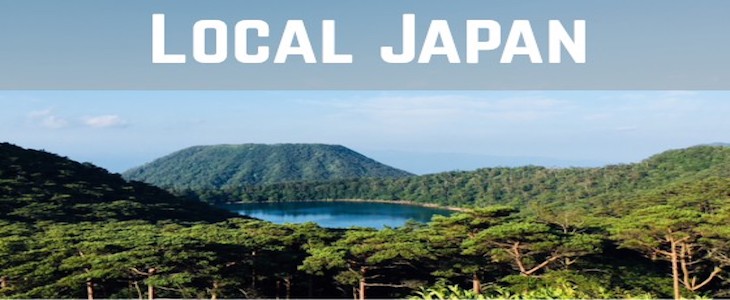
Local Japan: Warm People & Warm Nature in Miyazaki
Two years ago, I couldn’t locate Miyazaki Prefecture on a map, and then I moved there. Like many others who move to Japan from abroad, I came to teach English as an ALT with a company who chose my location for me, and ultimately determined what my experience in Japan would be like. I requested Kyushu’s most populated area, Fukuoka, and instead was given Fukuoka’s lesser-known sister Miyazaki. Not only that, but I was put in a small town surrounded by a wall of hills and mountains, and in the valley lie rice fields, roadside shrines, and convenience stores. The problem for me was that the rice fields and roadside shrines were all around my apartment, yet the convenience stores were a 45-minute walk away. Thankfully, I had access to a rental car, which made exploring much easier, but it was a big difference from my suburban lifestyle in the US where an abundance of shops, restaurants, and parks can be found all around.
Needless to say, life in Miyazaki was quiet. From my home, an open floorplan studio apartment fit for one person, the primary sign of life came from the hushed grumble of trucks driving past, which I always assumed must be driving off to some bigger town. And there was wildlife, too – humming cicadas, spiders the size of your hand, skinny snakes slithering on buildings, and a bird who persisted in making a nest on a vent hood outside my front door, even though my building manager kept knocking it down (I was always on Team Bird).
This isn’t to say that there weren’t people. The people in Miyazaki were often exceptionally friendly and courteous, easily harmonizing with the sunny and warm climate of southwestern Japan. I learned much more about how to adjust to my new life in rural Kyushu through the people around me offering advice and directions, rather than by doing a search online. I often visited a nearby bakery, which always served the locally famous cheese manju (still my all-time favorite food, by the way), and the university-aged girl working there would always try her best English to speak with me. Food shops and restaurants would often give a little extra gift with my purchase and ask me where I was from with a sincere interest. And the post office clerks would give me my mail, even if I wasn’t visiting them for that reason. Once, a man from the gas company came to my home for a safety inspection, and to my surprise, he rearranged the messy shoes in my genkan. I’m still not sure if I should have been insulted, but I think he meant well. This kind of personable and helpful demeanor was so common, it was almost predictable. In fact, perhaps the most unpredictable thing about Miyazaki, then, was the nature rather than the people who made up the small-ish population.

I moved there when spring flowers had just bloomed and quickly made way to summer heat, and in these warm months the most striking changes around me were found in nature – wet fields from a series of rainy days or finding that the mountains outside my window were dressed in clouds on a gray morning or seeing fresh sakura petals dusting the sidewalks. It seemed natural, no pun intended, to become connected to the nature surrounding me, and it felt like a privilege to be so immersed in such a beautiful environment with clean air and plenty of land left virtually untouched. There, as Shinto religion dictates, purity and nature seemed to hold more power than the people. My focus, then, turned to the more natural elements of the town.

In fact, just two weeks after moving into my apartment, while sitting on my futon, I was reminded of the powerful nature around me as I felt the distant Kumamoto earthquake rock my futon like a boat, which would continue for weeks as aftershocks lingered. Unsurprisingly, I received a flood of texts to my phone from Japanese friends and co-workers, worrying that such a large earthquake would have startled an American like me. Even though the town was quiet around me following the earthquake, returning to its ordinary stillness, this was a reminder that it was never really lonely there.
Aside from the earthquake, nature colored many other memories I hold from Miyazaki. Still one of my favorite places I have ever visited in the world is the beach at Aoshima and the path around Aoshima Shrine. During the summer, stylish food stalls and hammocks pop up next to the ocean, where I spent some of my most blissful moments. I also enjoyed taking in serene sights of the mountains at Lake Miike and overlooking volcanoes at Ebino Plateau. Sometimes, during an ordinary drive, I’d find a surprise meadow with brightly hued flowers or a road going up a mountain that offered stunning views.

I have since left Miyazaki and moved to Tokyo, but whenever I escape the city for a weekend trip, I always think back to Miyazaki. Living in small-town Japan can feel sleepy and, quite frankly, boring at times. But it’s this space of quietness and predictability that allowed me to appreciate the simplicity. Living in a big city like Tokyo, busyness and stress is contagious. Living in a small town, especially in the warmth of western Japan, relaxation and friendliness are contagious. Perhaps sometimes it took a little more effort in Miyazaki to find fun and exciting things to do, but sometimes living in a big city requires more effort to find calm and quiet.
When I left my old Miyazaki town, I returned my rental car and had to – for the first and last time – take the local train in order to make my departure. I entered the station, and took a ticket from a box with no attendant and no machine. Sitting on the platform, waiting for the small rusted train to come, I looked at my town one last time. I looked at the mountains in the distance and the fields and the simple yet spacious houses with their laundry hanging outside. It was only me at the station leaving, perhaps because everyone else was in their predictable place, serving cheese manju at the bakery or delivering mail or tending to their farm. That sense of calm and quiet is exactly as it should be in a place like Miyazaki. When Tokyo gets too loud and the trains are too crowded, I think back to being alone at the station in Miyazaki and appreciate that time in my life in Japan.
For those who may find themselves moving to a small town like my old one, there may be a separate culture shock from the shock of changing countries if you’re not accustomed to rural life. Finding friends locally and practicing Japanese can help make this process much smoother. Things like doctor visits or even supermarket runs may also take some additional planning in a town like this – for example, a doctor specializing in a specific ailment may only be found in the nearest big city, and supermarkets may close earlier than expected. Additionally, having a car makes navigating a sparse area much easier, especially if trains don’t run often or you need to visit a neighboring town to see friends or run errands. With preparation and patience, though, taking up residence in a little countryside town in Japan can be an extremely rewarding experience offering a different perspective from living in the big city.





